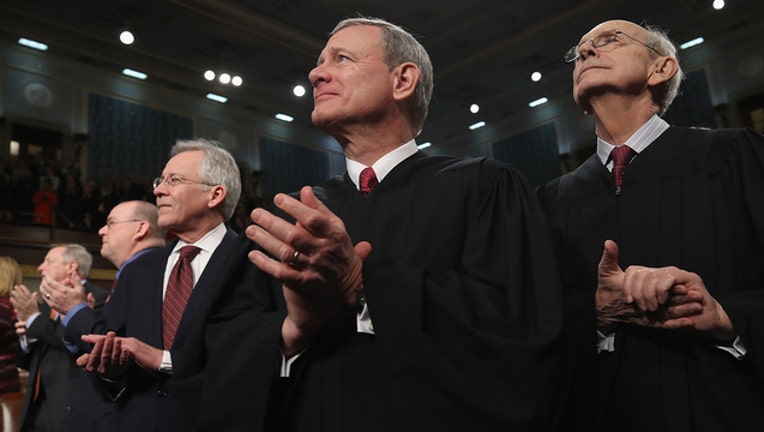Justice Roberts rebukes Trump's 'Obama judge' comment

U.S. Supreme Court Chief Justice John G. Roberts (center) and U.S. Supreme Court Associate Justice Stephen G. Breyer (R) watch during the State of the Union address, January 30, 2018 (Photo by Win McNamee/Getty Images)
WASHINGTON (AP) - In an extraordinary rebuke of a president, Chief Justice John Roberts chastised Donald Trump Wednesday for going after a judge who ruled against his migrant asylum order as an "Obama judge."
Trump quickly lashed back defending his own criticism.
It's the first time the Republican-appointed leader of the federal judiciary has offered even a hint of criticism of Trump, who had previously blasted other federal judges who ruled against him. In a brief but pointed statement, Roberts strongly defended the independence of the federal judiciary and rejected the notion that judges are loyal to the presidents who appointed them.
"We do not have Obama judges or Trump judges, Bush judges or Clinton judges. What we have is an extraordinary group of dedicated judges doing their level best to do equal right to those appearing before them," Roberts said in a statement that was released by the Supreme Court after a query by The Associated Press.
On the day before Thanksgiving, he concluded, "The independent judiciary is something we should all be thankful for."
Never silent for long, Trump hit back from his resort home in Florida, bluntly questioning the independence of federal judges appointed by his predecessor and others and confirmed by the U.S. Senate. He especially criticized those on California's 9th U.S. Circuit Court of Appeals.
"Sorry Chief Justice John Roberts, but you do indeed have 'Obama judges,' and they have a much different point of view than the people who are charged with the safety of our country," the president tweeted.
If the 9th Circuit judges are independent, he said, "why are so many opposing view (on Border and Safety) cases filed there, and why are a vast number of those cases overturned. ... these rulings are making our country unsafe! Very dangerous and unwise!"
Before Trump, it had been highly unusual for presidents to single out judges for personal criticism. And a chief justice's challenge to a president's comments is unprecedented in modern times.
But Roberts and the high court find themselves at an especially stressful moment. In the aftermath of Trump's appointment of Justice Brett Kavanaugh, several justices have spoken out about judicial independence and the danger of having the court viewed merely as a political institution divided between five conservative Republicans and four liberal Democrats. Roberts is widely seen as the justice closest to the middle and likely to determine the outcome of high-profile cases that split the court.
The White House had no immediate response to a request for comment on Roberts' criticism.
Trump has shown no reticence about criticizing the judiciary. Last year, the president scorned the "so-called judge" who made the first federal ruling against his travel ban. During the presidential campaign, he criticized Roberts himself for the chief justice's decisive vote in 2012 to preserve President Barack Obama's health care overhaul.
Trump also referred to an Indiana-born judge of Mexican descent, who was presiding over a fraud lawsuit against Trump University, as a Mexican who would be unable to rule fairly because of Trump's proposal to build a wall along the U.S.-Mexican border.
The president's latest remarks were made Tuesday when a reporter asked for his reaction to a ruling by U.S. District Judge Jon Tigar in San Francisco that put the administration's asylum policy on hold. Under that new policy, Trump declared no one could apply for asylum except at an official border entry point. That tends to back migrants up for weeks if not months.
A number of migrants remain camped in Tijuana after traveling in a caravan to reach the U.S.
In Washington, meanwhile, Defense Secretary Jim Mattis said Wednesday the White House has given him authority to use military troops to protect Customs and Border Protection personnel, with lethal force if necessary, at the southwest border. The mission thus far for about 5,800 active-duty troops at the border has been mainly to lay barbed wire.
On Tuesday, the president complained that his opponents file lawsuits in courts that are part of California's liberal-leaning 9th U.S. Circuit Court of Appeals. It's not unusual for those challenging a president's policies to sue in courts they consider likely to back their claims. Conservative groups tended to bring challenges to Obama-era policies in Texas, part of the conservative-leaning 5th U.S. Circuit Court of Appeals.
"Every case that gets filed in the 9th Circuit, we get beaten. And then we end up having to go to the Supreme Court, like the travel ban, and we won," Trump said.
The president went on to say about the asylum ruling: "This was an Obama judge. And I'll tell you what, it's not going to happen like this anymore. "
In fact, the initial travel ban ruling in 2017 was issued by U.S. District Judge James Robart, an appointee of President George W. Bush in Washington state. Roberts, too, was appointed by Bush.
It was unclear what Trump meant when he said things would change. The 9th Circuit is by far the largest of the federal appellate courts, covering Alaska, Arizona, California, Hawaii, Idaho, Montana, Nevada, Oregon and Washington. Some Republicans in 9th Circuit states have proposed splitting the circuit in two, but legislation has not advanced.
The court has long had a majority of judges appointed by Democratic presidents, with the current breakdown at 16-7. But Trump has the opportunity to narrow that edge significantly because there are six vacancies, and he already has nominated candidates for five of them.

